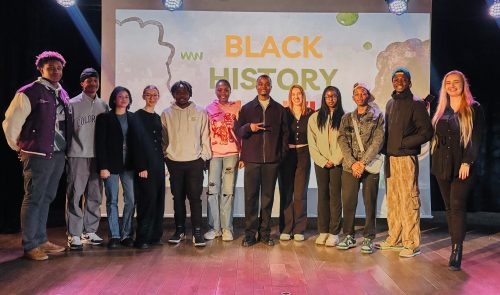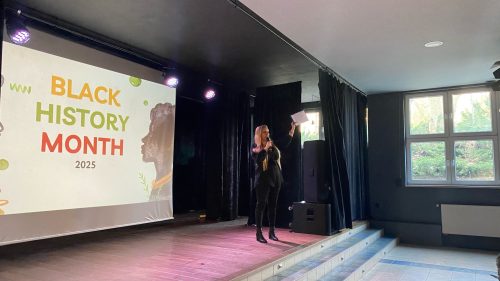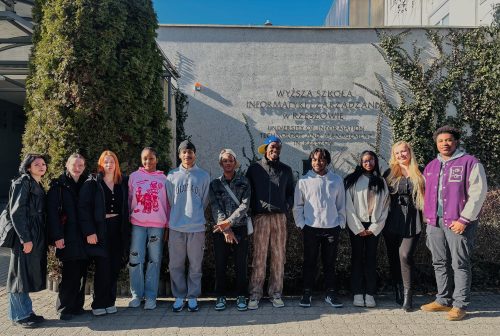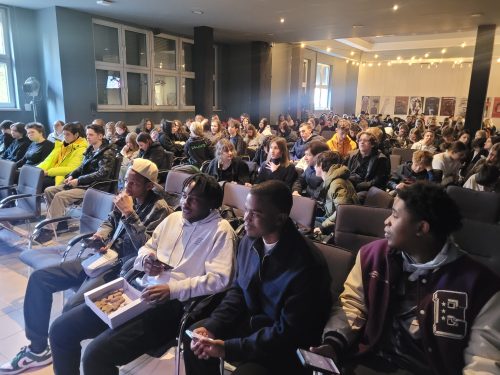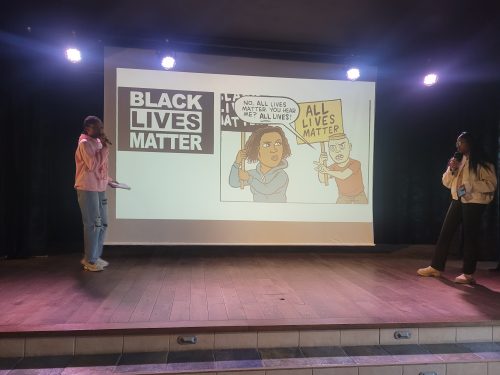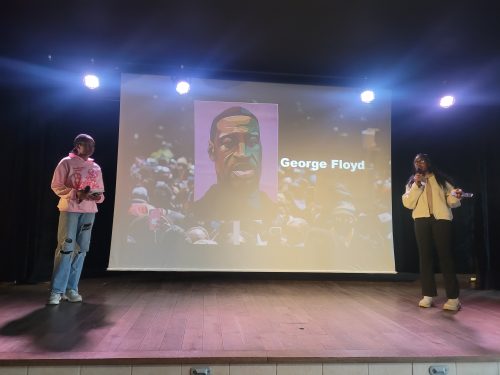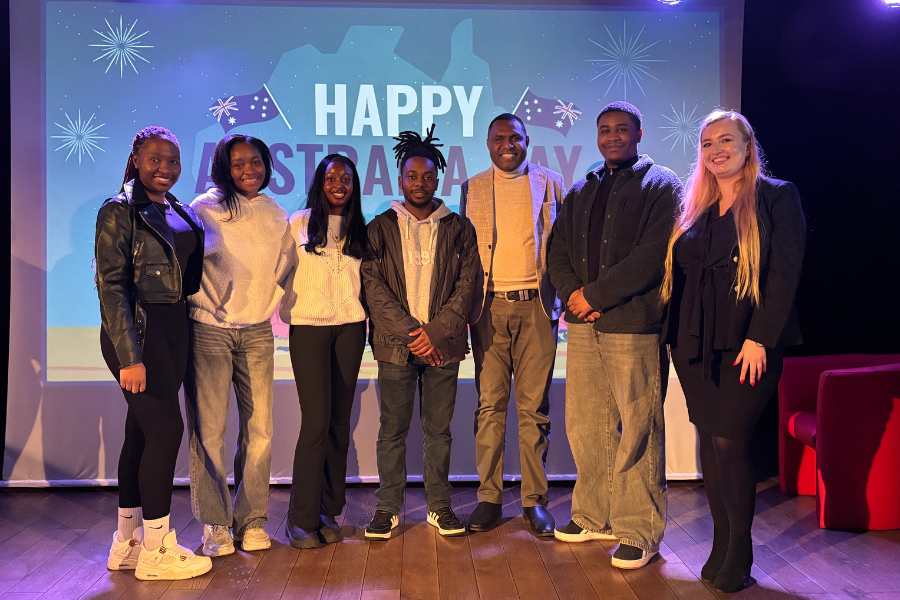On February 10th, UITM hosted an inspiring and energetic Black History Month event at IQ Club, bringing together students, faculty members, and high school students from the region to honor the rich cultural heritage and historical contributions of Black communities worldwide. The event featured a diverse range of lectures, quizzes, presentations, discussions, and performances, creating a space for learning, dialogue, and cultural exchange.
Why Do We Celebrate Black History Month?
Black History Month is an annual event observed in February in the United States and Canada and in October in the United Kingdom. It aims to acknowledge and celebrate the contributions of Black communities to history, culture, and societal development. Initiated by Dr. Carter G. Woodson in 1926 as Negro History Week, it later evolved into a month-long commemoration dedicated to education, reflection, and appreciation of Black heritage.
„Black History Month is a time to honor the past, celebrate the present, and inspire the future. It is a moment for reflection on past injustices but also an opportunity to recognize the immense contributions of Black communities to culture, science, and the arts. It is crucial that we continue these conversations, learn from one another, and build a more informed society,” emphasized Dr. Paula Wieczorek, Vice Dean of the College of Media and Social Communication at WSIiZ.
„One of the key elements of this event was the opportunity to hear personal stories and experiences directly from those most affected. It is especially important to highlight contemporary social movements like Black Lives Matter, which emphasize that the fight for equality and justice is still ongoing. Thanks to the engagement of students from different parts of Africa, participants could authentically experience Black culture, history, and contemporary challenges.
This event provided a space for reflection on how we can actively support change and promote greater awareness in society. Attendees did not merely listen to lectures—they actively participated in discussions, music, dance, and other interactive forms of learning, making the experience more engaging and effective,” added Dr. Wieczorek.
Interactive Lectures on Civil Rights History
The first part of the event featured an interactive lecture on Black History Month, led by Dr. Paula Wieczorek and Isaac Mhaka, a Social Work student from Zimbabwe. The lecture covered key moments, influential figures, and lesser-known facts about Black history. It presented the story of Rosa Parks, whose refusal to give up her seat on a bus sparked the Montgomery Bus Boycott, as well as highlighted Harriet Tubman’s role in leading enslaved people to freedom through the Underground Railroad. The successes of Barack Obama as the first Black president of the United States were also discussed.
Isaac Mhaka then led a session comparing the philosophies of Malcolm X and Martin Luther King Jr. „Both were leaders with different strategies, but their ultimate goal was the same: justice and equality,” he explained. In this session, he also covered other key figures of the civil rights movement. Along with Ramazan Amangaldiyev, he examined Nelson Mandela’s impact on the fight against apartheid in South Africa. Their presentation demonstrated how different approaches and strategies could lead to the same objectives—equality and social justice.
Music, Dance, and Cultural Exploration
The second part of the event focused on the cultural influence of Black communities, particularly in the field of music. Leonel Mugano, a Nursing student from Nigeria, presented a lecture titled From Harlem to Afrobeats: The Global Influence of Black Music, showcasing the evolution of Black music and its impact on global culture. His interactive quiz engaged participants in testing their knowledge of Afrobeats and legendary artists.
Alicja Kot, Marlena Kret, and Katarzyna Wilk, English Philology students, led the Afrobeats Challenge, where participants attempted to identify artists and songs.
Ransford Asare delivered a presentation titled Made in Ghana, introducing participants to Ghanaian music’s unique rhythms and styles, while Donald Matsheza, in his talk Zimbabwe vs. South Africa, compared the cultural differences between the two nations. Nyashe Mukechi captivated the audience with a spectacular dance performance, bringing the energy of traditional African movements to the event.
„Music is one of the most powerful tools for storytelling and cultural preservation,” observed Karolina Winiarska, editor of Rzeszów Info and a guest at the event. „Having young people from Africa themselves share their stories makes their message even more authentic and engaging. This way, participants do not just hear about history—they experience it through singing, dancing, and interactive musical activities. Such an approach resonates best with young people, allowing them to directly connect with the culture they are learning about.”
Discussions on Representation, Identity, and Social Justice
After a short break, the final part of the event centered on thought-provoking discussions led by Rumbidzo Chando and Riana Baloyi. Their presentation, Black Lives Matter: Fact or Fiction?, explored the movement’s goals, misconceptions, and impact, presenting its origins, historical context, and key events that shaped its development. The discussion covered the tragic death of George Floyd in 2020, which sparked international protests against police brutality and systemic racism. The speakers also addressed other incidents that fueled the movement’s support, as well as the controversies surrounding its actions and criticisms from certain political groups.
Following the presentation, an open debate took place, during which participants discussed Black representation in Hollywood, the marginalization of Black history in global education systems, and the varying narratives surrounding Black Lives Matter. Many attendees highlighted that the movement not only brought attention to racial injustice but also contributed to legislative changes and reforms in the justice system. The discussion also touched on how the movement is perceived in different parts of the world and its lasting impact on contemporary society.
Conclusion
Black History Month at WSIiZ combined education, cultural appreciation, and meaningful discussions. The event not only highlighted the importance of Black history but also emphasized the need for ongoing dialogue and representation. As Dr. Wieczorek aptly concluded, „This is not just a celebration—it is a commitment to learning, inclusion, and respect that should extend beyond February and into every day of the year.”
